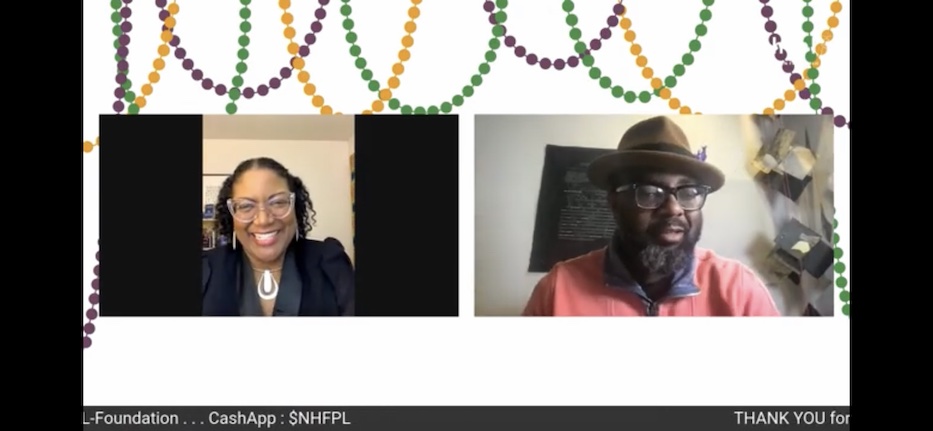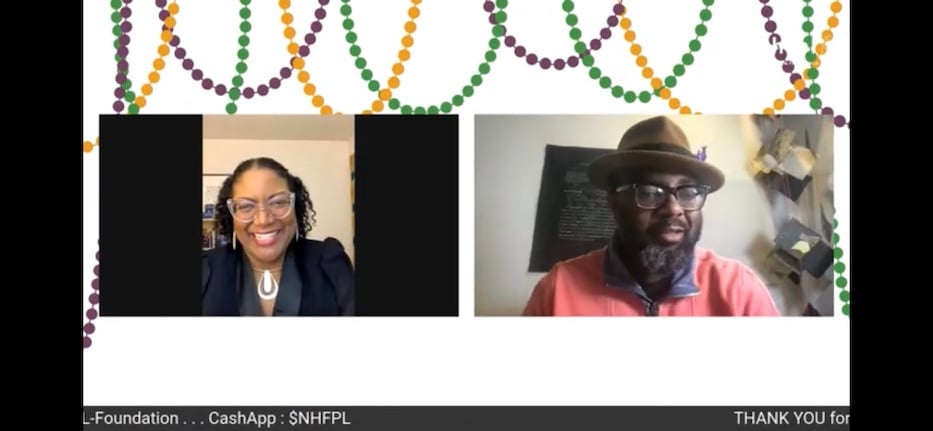
Books | Mardi Gras | Poetry | Arts & Culture | New Haven Free Public Library | Arts & Anti-racism

Honorée Fanonne Jeffers and Reginald Dwayne Betts Tuesday night. Screenshot from YouTube.
Honorée Fanonne Jeffers found freedom in the books—and the people—who populated the library in a segregated Durham she once called home. Decades later, libraries and librarians have become a touchpoint in her work, as she opens some of the same intellectual doors those venerated institutions once opened for her.
Poet, professor, historian and the celebrated author of The Love Songs of W.E.B. Du Bois, Jeffers brought that history to New Haven Tuesday night, in a lively conversation with poet Reginald Dwayne Betts at New Haven Free Public Library's 25th annual Mardi Gras. Held online for the second year in a row, the event featured user testimonials, shoutouts from library staff and city residents, and brief remarks from the lobby of the new Stetson Library at the Dixwell Community Q House.
The conversation, so rich and intimate it sometimes seemed the authors had forgotten the virtual audience, stole the show.
Lauren Bisio, director of advancement for the New Haven Free Public Library (NHFPL) Foundation, said that the event raised close to $40,000 in gifts and pledged donations for the library. It also marked the library’s 135th anniversary in New Haven, where it has served city residents since 1877. It comes at a time when the NHFPL is very much looking toward its future: in New Haven’s newly proposed city budget, released Tuesday afternoon at City Hall, all library branches would remain open seven days a week.
"I love librarians," Jeffers said. "I love libraries. When I was a little girl—oh my God. Librarians were my best friends. I don't think I've ever met a librarian I didn't love.”
Nowhere, maybe, was that more evident than in the 30-minute dialogue that became at turns a lovefest for libraries, meditation on enslavement, freedom, and the carceral system, sharp-eyed (and tongued) take on race and racism, and party in the YouTube comments section. For half an hour together, Jeffers and Betts drew attendees into their literary web, the miles dissolving between them.
A self-described "very awkward child," Jeffers gravitated toward libraries because "I just felt special" when she stepped inside their walls. As a kid in Durham, North Carolina—where segregation was still the norm—she attended a Black library that became a home away from home. It was, she said, her Cheers moment: librarians all knew her by name, and called it out when she arrived. "They would make me feel special, you know, like a superstar," she said.
It was also where she first read the work of Frederick Douglass, who himself spoke about knowing he was free once he learned to read. His words, part of what she now considers Black canon, rocked her world.
"Being smart was so important in the library," she recalled. "Being a reader. And they would save the books for me."
It was also one of the only places where she could be comfortable with who she was. For years, Jeffers told Betts, she did not share with people that she had grown up in Section 8 Housing with supplemental food assistance. Her life was one of contradictions: her mother and father were both "deep intellectuals," while her grandmother Florence had gone only through the seventh grade, but had decades of lived experience. Her grandfather, who passed before her birth, had been unable to read.
"So I always had this connection to research in two different ways," she said. "And history in two different ways."
When she moved to Atlanta with her mom and older sister CeCe, Jeffers fell in love with libraries all over again, this time as a high schooler. At the time, her mom was in graduate school, and libraries became the place where Jeffers could go to do work. Her sisters were in college nearby at Spelman, so it was just her and her homework and her blazing mind among the books, tens of thousands of them.
"Is that cheating?" Betts asked, and an attendee could almost hear audience laughter ripple across New Haven if they listened closely enough. He explained that he didn't mean it in any conventional sense of cheating. He meant that Jeffers had learned to love libraries herself and then deepened that love when her mother was a grad student, rather than the other way around. Beaming, she pushed back: libraries were just one layer of a rich and complex childhood.
“I think if people look at my work, there’s always sort of this high-brow, intellectual, but then this sort of folk experience,” she said. “And so, that’s always the line that I tread.”
The two turned the conversation toward Jeffers' 2021 novel The Love Songs of W.E.B. Du Bois, which has made her a household name after five exquisite collections of poetry and a coveted spot in Oprah's Book Club ("Oprah’s a goddess," Jeffers said, laughing after Betts joked that he had dismissed the book club after his collection Felon didn't make the cut). In the book, Jeffers not only dives into, but also cracks open, Du Bois' notion of "double consciousness," weaving it into the weight and history of a family. The book draws not only from her own family history and childhood in the South, but also from an oral, documented, and literary tradition that is hundreds of years old, and of which she is now solidly a part.
No sooner had Betts started a question—"what I wonder is, how might you imagine this work hittin' the people that I want to read it"—than Jeffers jumped back in. Betts had hardly gotten the words "EJI" (Equal Justice Initiative) and "public defenders" out when she answered that the book is written for Black people—particularly Black women. The sheer complexity of her characters is an ode to the full spectrum of people's failure and humanity.
"I want everybody to read my book, but the love songs that are referred to, Du Bois' love songs, these are for my people," she said. "And so I wanted ... people who only read like, urban fiction, I wanted them to see characters that they connected to. And then I wanted historians to be like 'You did it.' As we say in the South, from the Rooter to the Tooter."
Betts, who first met Jeffers through her work when he was serving time in prison, said that her dedication to those readers is clear in her writing. And, in the best of ways, it's not an uncomplicated one.
"The power of the book is on the page," he said. "You come off as someone who really loves the people you are writing about."
Part of that, Betts continued, is Jeffers' ability to weave the history of forced migration, unpaid labor and continued economic disenfranchisement into very recent Black history (in other words "it made me understand the interconnectedness of slavery to being an 80s baby," he said). In the book, Jeffers has knitted together Reconstruction and Jim Crow, generational trauma, music, Black literature, and twentieth century history.
When Betts asked how she got there, Jeffers looked to the "spiritual history, the soul history" of Lucille Clifton, who was a close mentor and also a family friend (Betts has also pointed to Clifton’s work as especially foundational to his own poetry). She also dipped back into precolonial Black history, discovering societies that revered poets, griots, and historians. It means that she can't look at the War On Drugs and not also see a war on decades, if not also centuries, of "great Black spiritual power."
"I feel like there's something in the spirit that remembers everything that we have gone through as a people, here in this place, as Sonia Sanchez says, ‘Here in this place we call America,’" she said. "But also, I think that many of us who do this work ... come from shamanistic stock. And there's a power sometimes that we can't name."
Betts brought it back to the present, the book still humming beneath every question and every response. Earlier on Tuesday, he had spent the day on a call with a dozen men in the carceral system, some of whom had been in prison for decades and are serving life sentences. He kept thinking about how they aren't given access to "a kind of healing and freedom and forgiveness" that Jeffers makes available—however hard-fought—in the book.
It led him to think about his own Freedom Libraries, sleek library boxes with books nestled inside designed for prisons. Jeffers bobbed her shoulders, covered her mouth and gave a sweet little yell of enthusiasm as he spoke.
"I think it's just lovely, this idea that libraries, that we can't escape it," he said. "Libraries are truly a source of freedom."
"Absolutely they are!" she responded. "Coming from the belly of the best, in many ways, reading saved me. It gave me a sense of control when I did not have any control."
The celebration, which mirrored last year's conversation with Betts and Cave Canem co-founders and poets Toi Derricotte and Cornelius Eady, is just one of the ways the NHFPL has kept pivoting through the pandemic. When Covid-19 hit New Haven in March 2020, the library prioritized its digital resources, then moved to curbside pickup, lent out free laptops and Wi-Fi devices, and gradually reopened its branch locations.
In the months since, reopened branches have offered everything from take-and-make kits and virtual storytime to vaccine and booster clinics and small business training. Just last month, the library opened a passport office at its downtown branch, and has been running free tax prep out of its downtown and satellite locations.
"We're helping people thrive and we're helping people succeed," said Executive Director John Jessen. "And bringing them what it is that they're looking for and what they need."
Learn more about the New Haven Free Public Library at its website.

